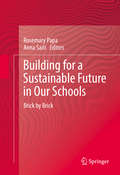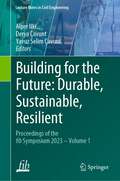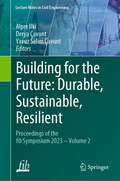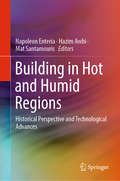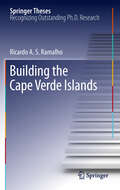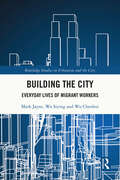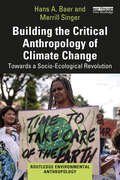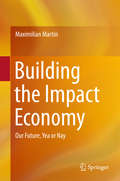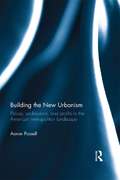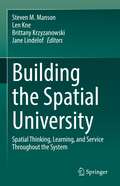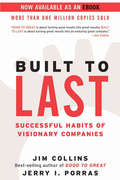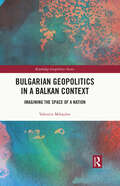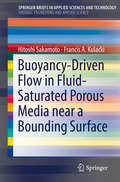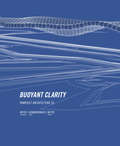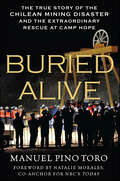- Table View
- List View
Building for a Changing Climate: The Challenge for Construction, Planning and Energy
by Peter F. SmithThere is now a practically universal consensus that our climate is changing rapidly, and as a direct result of human activities. While there is extensive debate about what we can do to mitigate the damage we are causing, it is becoming increasingly clear that a large part of our resources will have to be directed towards adapting to new climatic conditions, with talk of survivability replacing sustainability as the new and most pressing priority. Nowhere is this more evident than in the built environment – the stage on which our most important interactions with climatic conditions are played out. In this frank yet pervasively positive book, sustainable architecture guru Peter Smith lays out his vision of how things are likely to change, and what those concerned with the planning, design and construction of the places we live and work can and must do to avert the worst impacts. Beginning with the background to the science and discussion of the widely feared graver risks not addressed by the politically driven IPCC reports, he moves on to examine the challenges we will face and to propose practical responses based on real world experiences and case studies taking in flood and severe weather protection, energy efficient retrofitting, distributed power generation and the potential for affordable zero carbon homes. He ends with a wider discussion of options for future energy provision. This will be a provocative, persuasive and – crucially – practical read for anyone concerned with the measures we must take now to ensure a climate-proofed future for humanity.
Building for a Sustainable Future in Our Schools: Brick by Brick
by Rosemary Papa Anna SaitiThis book explores how educators can transform improvements from the dynamic process of teaching into far-reaching, sustainable reforms that can secure a more prosperous future for students and the world they inhabit. It establishes the role of leadership in educational sustainability and highlights methods of creating sustainable educational reforms. The authors emphasize the importance of implementing ethical and moral values in teaching sustainable practices, and discuss the critical relationship between the classroom and the local community and policies protecting planet earth. Furthermore, through the inclusion of research and case studies drawn from countries across the world, this valuable resource demonstrates how transformational leadership practices can contribute to a culture of sustainability in all classrooms, pre-K through university. Among the topics covered: - Social Capital Dimensions: Social Justice, Morality, and the Common Good - Classroom and Community Partners: The Ethics and Morality Inherent in Sustainable Practices - Developing a Culture for Sustainability in Educational Organisations and in Partnerships, i. e. , Across Disciplines and Communities - Understanding Leadership Practices in a Sustainable School Model: A Case Study from Turkey Educators, education researchers, and policymakers in education will findBuilding for a Sustainable Future in Our Schools: Brick by Brick to be a useful tool in understanding the critical role of education in sustainable development encouraging complementary relationships between humans and our earth.
Building for the Future: Proceedings of the fib Symposium 2023 - Volume 1 (Lecture Notes in Civil Engineering #349)
by Alper Ilki Derya Çavunt Yavuz Selim ÇavuntThis book presents the proceedings of the fib Symposium “Building for the future: Durable, Sustainable, Resilient”, held in Istanbul, Turkey, on 5–7 June 2023. The book covers topics such as concrete and innovative materials, structural performance and design, construction methods and management, and outstanding structures. fib (The International Federation for Structural Concrete) is a not-for-profit association whose mission is to develop at an international level the study of scientific and practical matters capable of advancing the technical, economic, aesthetic, and environmental performance of concrete construction.
Building for the Future: Proceedings of the fib Symposium 2023 - Volume 2 (Lecture Notes in Civil Engineering #350)
by Alper Ilki Derya Çavunt Yavuz Selim ÇavuntThis book presents the proceedings of the fib Symposium “Building for the future: Durable, Sustainable, Resilient”, held in Istanbul, Turkey, on 5–7 June 2023. The book covers topics such as concrete and innovative materials, structural performance and design, construction methods and management, and outstanding structures. fib (The International Federation for Structural Concrete) is a not-for-profit association whose mission is to develop at an international level the study of scientific and practical matters capable of advancing the technical, economic, aesthetic, and environmental performance of concrete construction.
Building from Tradition: Local Materials and Methods in Contemporary Architecture
by Elizabeth M. GoldenBuilding from Tradition examines the recent resurgence of interest in the handmade building and the use of local and renewable materials in contemporary construction. In the past, raw materials were shaped to provide shelter and to accommodate the cultural, social, and economic needs of individuals and communities. This is still true today as architects, engineers, and builders turn once again to local resources and methods, not simply for constructing buildings, but also as a strategy for supporting social engagement, sustainable development, and cultural continuity. Building from Tradition features global case studies that allow readers to understand how building practices—developed and refined by previous generations—continue to be adapted to suit a broad range of cultural and environmental contexts. The book provides: • a survey of historical and technical information about geologic and plant-based materials such as: stone, earth, reed and grass, wood, and bamboo; • 24 detailed case studies examining the disadvantages and benefits to using traditional materials and methods and how they are currently being integrated with contemporary construction practices.
Building in Hot and Humid Regions: Historical Perspective and Technological Advances
by Napoleon Enteria Hazim Awbi Mat SantamourisThis book presents an in-depth analysis covering climatic and weather conditions, house and building development history, construction methods and technologies, and environmental conditions. It provides relevant house and building information and highlights recent advances in hot and humid regions, as well as developments in other regions that are relevant to hot and humid climates. The countries in hot and humid regions, which include the tropical countries, the Middle Eastern countries around the Mediterranean, and many countries of Central Asia and Africa, are home to some of the most challenging conditions in the world in terms of house and building design and construction, and in terms of maintaining indoor thermal comfort and air quality in an energy-efficient way. The book’s respective chapters, prepared by expert contributors, cover essential concepts, designs, and construction methodologies for houses and commercial buildings. As such, the book offers a valuable resource for undergraduate and graduate students in architecture and engineering, house and building designers, and building sciences researchers. Building contractors, manufacturers and distributors of building equipment and devices, and government policymakers and legislators will also benefit from the information provided in this book.
Building on Borrowed Time: Rising Seas and Failing Infrastructure in Semarang
by Lukas LeyA timely ethnography of how Indonesia&’s coastal dwellers inhabit the &“chronic present&” of a slow-motion natural disaster Ice caps are melting, seas are rising, and densely populated cities worldwide are threatened by floodwaters, especially in Southeast Asia. Building on Borrowed Time is a timely and powerful ethnography of how people in Semarang, Indonesia, on the north coast of Java, are dealing with this global warming–driven existential challenge. In addition to antiflooding infrastructure breaking down, vast areas of cities like Semarang and Jakarta are rapidly sinking, affecting the very foundations of urban life: toxic water oozes through the floors of houses, bridges are submerged, traffic is interrupted. As Lukas Ley shows, the residents of Semarang are constantly engaged in maintaining their homes and streets, trying to live through a slow-motion disaster shaped by the interacting temporalities of infrastructural failure, ecological deterioration, and urban development. He casts this predicament through the temporal lens of a &“meantime,&” a managerial response that means a constant enduring of the present rather than progress toward a better future—a &“chronic present.&” Building on Borrowed Time takes us to a place where a flood crisis has already arrived—where everyday residents are not waiting for the effects of climate change but are in fact already living with it—and shows that life in coastal Southeast Asia is defined not by the temporality of climate science but by the lived experience of tidal flooding.
Building the Cape Verde Islands (Springer Theses)
by Ricardo A. RamalhoHotspots are enigmatic surface features that are not easily explained in the framework of plate tectonics. Investigating their origin is the goal of this thesis, using field evidence collected in the Cape Verde Islands, a prominent hotspot archipelago in the eastern Atlantic Ocean. The approach taken is to document uplift of the islands relative to sea level and use the uplift features to test various models of hotspot development. Island uplift is thought to arise from the growth of the anomalously shallow seafloor on which the islands rest, known as the bathymetric swell, which is characteristic of hotspots. The work comprises a geological summary and detailed mapping of paleo sea level markers on Cape Verde. Isotopic dating of the markers shows that uplift on the islands over the last 6 Myr is up to 400 m, and that the uplift chronology varies among islands. Two processes act to raise the Cape Verde Islands. The dominant process is one that is local to individual islands. The regional, swell-related component is smaller, and possibly episodic. The observations provide strong constraints on swell development and on hotspot models.
Building the City: Everyday Lives of Migrant Workers (Routledge Studies in Urbanism and the City)
by Mark Jayne Wu Siying Wu ChenhuiBuilding the City elaborates new critical insights into the everyday lives of migrant workers in cities around the world.The book offers complementary blending of longstanding political-economic accounts of migration, gender, labour, and urban life alongside advances in feminist, postcolonial, post-structural, materialist, and more-than-representational theories. Drawing on these critical resources the authors explore the complexities of migrant’s everyday past, present, and future lives. More specifically, they interrogate diverse and heterogeneous connections between work, domestic, and family times and spaces as well as foregrounding new theoretical and empirical terrain regarding consumption, pleasure, leisure, fashioned, sexual identities, and digital lives within and beyond cities.Premised on ethnographic research undertaken in cities across China the authors develop a detailed relational comparative dialogue with the most up-to-date international interdisciplinary research.This critically challenging yet engaging and accessible research monograph provides an excellent resource for scholars at all career stages as well as undergraduate and postgraduate students in diverse disciplines including anthropology, cultural studies, economics, management, organisation, and business studies, human geography, planning, political science, sociology, and urban studies.
Building the Critical Anthropology of Climate Change: Towards a Socio-Ecological Revolution (Routledge Environmental Anthropology)
by Merrill Singer Hans A. BaerThis book applies a critical perspective to anthropogenic climate change and the global socio-ecological crisis.The book focuses on the critical anthropology of climate change by opening up a dialogue with the two main contending perspectives in the field, namely the cultural ecological and the cultural interpretive perspectives. Guided by these, the authors take a firm stance on the types of changes that are needed to sustain life on Earth as we know it. Within this framework, they explore issues of climate and social equity, the nature of the current era in Earth’s geohistory, the perspectives of the elite polluters driving climate change, and the regrettable contributions of anthropologists and other scholars to climate change. Engaging with perspectives from sociology, political science, and the geography of climate change, the book explores various approaches to thinking about and responding to the existential threat of an ever-warming climate. In doing so, it lays the foundation for a brave new sustainable world that is socially just, highly democratic, and climatically safe for humans and other species.This book will be of interest to researchers and students studying environmental anthropology, climate change, human geography, sociology, and political science.
Building the Green Economy
by Kevin Danaher Shannon Biggs Jason MarkAfter centuries of economic activity based on extraction, exploitation, and depletion, we now face undeniable environmental threats. New business models that save or restore natural resources are critical. But how can we translate that insight into more sustainable practices? Building the Green Economy shows how community groups, families, and individual citizens have taken action to protect their food and water, clean up their neighborhoods, and strengthen their local economies. Their unlikely victories-over polluters, unresponsive bureaucracies and unexamined routines-dramatize the opportunities and challenges facing the local green economy movement.
Building the Impact Economy: Our Future, Yea or Nay
by Maximilian MartinThis book develops a comprehensive framework for creating sustainable new business approaches on a massive scale. It relates the power of entrepreneurship, investment and technology to four areas in which progress is urgently needed to get out of the world's current impasse. These are: game-changing innovations in companies; a way forward for the global fashion industry that reconciles competitiveness and worker dignity; turning around the energy crisis; and restoring capital markets to being the funders of human progress and prosperity that they once were--the pieces of the puzzle that is our future. Numerous case studies and actionable guidelines show how to concretely get the job done.
Building the New Urbanism: Places, Professions, and Profits in the American Metropolitan Landscape
by Aaron PassellThe New Urbanism is perhaps the most influential movement that has emerged in suburban design, planning, and development in recent decades. It proposes to reform conventional suburban development by "building community." Building the New Urbanism asks "why new urbanism now?" to provide the first in-depth sociological investigation of the emergence of this phenomenon. This volume situates the growth of New Urbanism in the history of urban and suburban policy and development. The book builds an account of the movement’s founding and development, linking its progress to the making of new places. The volume also investigates how the movement capitalized upon dynamics within architecture, planning, and the homebuying public to recruit support from among those groups. The book establishes a framework for analyzing the opportunities and constraints that confront any effort to change the way we produce the built environment. Moreover, it reveals how elaborately social the production of the built environment is and how specific the material solutions to social conditions must be to resolve this process. Building the New Urbanism is an accessible volume that encapsulates and engages the dominant history of American suburbia. It draws on interviews with key figures, brings the work of prominent theorists of culture and science into the investigation, and broadens the focus of urban studies to the metropolitan region. It will be of particular interest to scholars and students of urban and suburban development, sociology, geography, and planning.
Building the Spatial University: Spatial Thinking, Learning, and Service Throughout the System
by Steven M. Manson Len Kne Brittany Krzyzanowski Jane LindelofThis volume discusses the concept of The Spatial University as part of the broad growth of spatial science and the need for spatial infrastructure in colleges and universities. The book centers on the development of U-Spatial, the spatial science infrastructure at the University of Minnesota that offers a range of spatial activities and services, including data access, training, and community building. Against a backdrop of the changing nature of research, teaching, and service in higher education, the story of U-Spatial anchors a broader discussion of what it means to be a spatial university. This narrative framing demonstrates—with specific examples—the importance of institutions offering dedicated spatial research infrastructure. In six chapters, the text explores the importance of spatial thinking, learning, and research for student and researcher success. The volume offers lessons that are applicable far beyond the University of Minnesota to apply to a broad array of domains and institutional specializations. The book will be useful to students, researchers, and policymakers concerned with how institutions can encourage spatial research, teaching, and service. It will also appeal to researchers and practitioners interested in broader uses of spatial science.This book shows how GIS can transform a university, speaking to the need for leadership in higher education around the power of bringing everything together using spatial and geographic concepts. Jack Dangermond Co-Founder and President, Esri
Building-Integrated Photovoltaic Systems (BIPVS)
by Andrés Julián Aristizábal Cardona Carlos Arturo Páez Chica Daniel Hernán Ospina BarragánThis book discusses building-integrated photovoltaic systems (BIPV) and provides solutions for solving problems related to designing, sizing and monitoring a BIPV that has been used to replace conventional building materials in parts of the building envelope such as the roof, skylights or facades. The book begins by introducing the basics to readers interested in learning about this technology and then outlines in an accessible way, a practical development plan for the installation and monitoring of these systems in residential, industrial, and commercial buildings. Chapters discuss the needs of installing, designing, and sizing and provide a financial analysis for a successful implementation of a BIPV system. This book is a useful tool for renewable energy designers, energy contractors, architects, government institutions, and those in the academic community who are interested in seamlessly integrating solar panels into the construction phase of new building projects or retrofitted into existing buildings.
Building-Integrated Photovoltaics: A Technical Guidebook
by Nuria Martín Chivelet Costa Kapsis Francesco FrontiniBuilding-integrated photovoltaics (BIPV) is an innovative technology offering a variety of building envelope solutions, materials, and colours for virtually any building surface. These BIPV products generate on-site renewable electricity, turning buildings from energy consumers to producers. BIPV is expected to play an indispensable role in the transition towards decarbonisation and energy resilience of cities, effectively reducing energy consumption and greenhouse gas emissions. Lack of knowledge and guidance on designing BIPV systems has hindered this technology's widespread adoption and creative applications. As a remedy, this guidebook presents best practices and decision-making processes for efficient and resilient architecture. Featuring more than 50 annotated reference drawings—roofs, solar shadings, rainscreen façades, curtain walls and double skin façades—and 24 international BIPV case studies, the guidebook provides building professionals with the technical knowledge and inspiration to implement BIPV technology in the built environment.
Buildings and Society: Essays on the Social Development of the Built Environment
by Anthony D. KingFirst Published in 1984. Routledge is an imprint of Taylor & Francis, an informa company.
Buildings for People: Responsible Real Estate Development and Planning
by Justin B. Hollander Nicole E. StephensBUILDINGS FOR PEOPLE Buildings for People: Responsible Real Estate Development and Planning explores how to balance social concerns with financial and investment considerations without sacrificing profit. This timely volume provides key technical and practical knowledge while exploring real estate development and planning through a multi-level lens—revealing the systemic factors that both govern and are governed by the real estate process. Beginning with site selection, the authors discuss financing, site improvement, architecture, landscape architecture, site planning, construction, and evaluation within a broader political, economic, and social context. Throughout the text, the authors explain key theories and methods of professional practice, and highlight how important social issues are interconnected to the business of real estate development and planning. Demonstrating how the desire for profit can be balanced with the needs of society Buildings for People: Responsible Real Estate Development and Planning is an excellent textbook for advanced undergraduate and graduate students in real estate, urban planning, urban design, and urban studies courses, as well as a valuable resource for researchers and professionals who want a multidisciplinary understanding of the built environment.
Built Environment and Walking & Cycling Around Metro Stations (Urban Sustainability)
by Yanan LiuThis book explores the relationship between pedestrians/cyclists’ mode and route choice to/from metro/railway stations and the micro-level (street-scale) built environment in a second-tier city in China. More specifically, it investigates how the street-scale built environment influences pedestrians/cyclists’ mode choice and route choice behavior and examines user preferences for the micro-level built environment around metro stations. The focus on a second-tier city is motivated primarily to expand the set of Chinese cities where the effects of the built environment on pedestrian/cyclist mode and route choice have been studied. Results demonstrate the effects of the street-scale built environment on pedestrian flows. The effects are higher for the main road, which is directly connected with the metro station. The findings of this book are expected to support the design of preferred walking/biking built environments around a metro station. This book appeals to urbanists, planners, engineers, policy makers, and those interested in a wide-ranging overview of slow/green transportation and built environment promotion. These methods not only help to understand the quantitative relationship between built environment design and travel behavior but also support the evaluation and assessment of built environment design in urban planning projects. It reduces the gap in our understanding of the quantitative relationship between the micro-level built environment and pedestrians/cyclists’ transportation mode and route choice around the metro station. Both stated choice data and revealed choice data were used. An extended set of micro-level built environment attributes was developed. Besides the widely studied transportation-related factors, street-level built environment factors were studied using quantitative methods.
Built to Last: Successful Habits of Visionary Companies (Good to Great #2)
by Jerry I. Porras Jim Collins"This is not a book about charismatic visionary leaders. It is not about visionary product concepts or visionary products or visionary market insights. Nor is it about just having a corporate vision. This is a book about something far more important, enduring, and substantial. This is a book about visionary companies." So write Jim Collins and Jerry Porras in this groundbreaking book that shatters myths, provides new insights, and gives practical guidance to those who would like to build landmark companies that stand the test of time.Drawing upon a six-year research project at the Stanford University Graduate School of Business, Collins and Porras took eighteen truly exceptional and long-lasting companies -- they have an average age of nearly one hundred years and have outperformed the general stock market by a factor of fifteen since 1926 -- and studied each company in direct comparison to one of its top competitors. They examined the companies from their very beginnings to the present day -- as start-ups, as midsize companies, and as large corporations. Throughout, the authors asked: "What makes the truly exceptional companies different from other companies?"What separates General Electric, 3M, Merck, Wal-Mart, Hewlett-Packard, Walt Disney, and Philip Morris from their rivals? How, for example, did Procter & Gamble, which began life substantially behind rival Colgate, eventually prevail as the premier institution in its industry? How was Motorola able to move from a humble battery repair business into integrated circuits and cellular communications, while Zenith never became dominant in anything other than TVs? How did Boeing unseat McDonnell Douglas as the world's best commercial aircraft company -- what did Boeing have that McDonnell Douglas lacked?By answering such questions, Collins and Porras go beyond the incessant barrage of management buzzwords and fads of the day to discover timeless qualities that have consistently distinguished out-standing companies. They also provide inspiration to all executives and entrepreneurs by destroying the false but widely accepted idea that only charismatic visionary leaders can build visionary companies.Filled with hundreds of specific examples and organized into a coherent framework of practical concepts that can be applied by managers and entrepreneurs at all levels, Built to Last provides a master blueprint for building organizations that will prosper long into the twenty-first century and beyond.
Bulgarian Geopolitics in a Balkan Context: Imagining the Space of a Nation (Routledge Geopolitics Series)
by Valentin MihaylovThis book is about the geographic space as an inseparable component of a nation’s historical memory, territorial awareness, geopolitical visions, and obsessions.The empirical part of the book focuses on the critical analysis of first-hand sources containing representations of the imagined spaces and places of Bulgaria and Bulgarians from a long-term perspective. The research results are structured in accordance with the author’s model of an imagined national space. It contains three general domains: possessed national space, the ethnogeopolitical neighbourhood, and ancient and legendary spaces. The book also explores how Bulgarians’ historical and ethnic spaces are linked with specific geopolitics, such as passive internal geopolitics, soft revisionism, non-intervening geopolitical claims, blocking international integration as a disguised form of old territorial claims, and emerging historical geopolitics. It examines how the imagined national space is approached by statesmen, politicians, academics, and other creators of ‘high’ geopolitics. The book also pays attention to the role of spatial imaginations in growing ‘low’ (popular) geopolitics, which includes media, popular culture, and national mythology.Written in an interdisciplinary manner, this timely book will attract the interest of scholars and students in geopolitics, human geography, international relations, nationalism studies, and ethnic history.
Buoyancy-Driven Flow in Fluid-Saturated Porous Media near a Bounding Surface (SpringerBriefs in Applied Sciences and Technology)
by Francis A. Kulacki Hitoshi SakamotoThis Brief reports on heat transfer from a solid boundary in a saturated porous medium. Experiments reveal overall heat transfer laws when the flow along the wall is driven by buoyancy produced by large temperature differences, and mathematical analysis using advanced volume-averaging techniques produce estimates of how heat is dispersed in the porous zone. Engineers, hydrologists and geophysicists will find the results valuable for validation of laboratory and field tests, as well as testing their models of dispersion of heat and mass in saturated media.
Buoyant Clarity (Pamphlet Architecture #36)
by Daniel Hemmendinger Christopher Michael Meyer Shawna Michelle MeyerThis newest addition to the Pamphlet Architecture series, long admired for its willingness to propose architectural solutions to challenging problems addresses the issue of rising sea levels with an interrogation of the concept of floating cities, a field of inquiry gaining increasing relevance and urgency with the impending reality of climate change. The authors explore notions of buoyancy and the amphibious through a typology based on human response and adaptation, to one of the hosting pressing issues of our day.
Buried Alive: The True Story of the Chilean Mining Disaster and the Extraordinary Rescue at Camp Hope
by Manuel Pino ToroThe inside story of the thirty-three Chilean miners trapped 2,300 feet underground that captivated the worldOn August 5, 2010, a tunnel in the gold and copper mine in the Atacama Desert in Chile collapsed, with all of its miners trapped underground. For days, the families waited breathlessly as percussion drills searched out signs of life. Finally, a note came back from below--the miners were alive and safe. Now the rescue crew needed to burrow through 2300 feet of solid rock to get them out. For nine weeks, the world watched as Chile threw all of its resources into the effort. Televisions flashed images of worried families holding vigil night and day and of Chile's newly elected President Pinera making their recovery his personal crusade. What the cameras didn't reveal was the behind-the-scenes intrigue: the corruption that led to faulty construction of the tunnel in the first place; how the men lived in a muddy and humid environment where the temperature was unbearably hot; how the rescue effort became a political campaign to raise the president's sagging numbers; and the abundant hope necessary to sustain the men in their underground captivity. Author Manuel Pino takes us into his native Chile and, drawing on direct access to the miners and their families, weaves a rich narrative of extraordinary survival and triumph.
Buried Sunlight: How Fossil Fuels Have Changed the Earth
by Molly Bang Penny ChisholmAcclaimed Caldecott Artist Molly Bang teams up with award-winning M.I.T. professor Penny Chisholm to present the fascinating, timely story of fossil fuels. What are fossil fuels, and how did they come to exist? This engaging, stunning book explains how coal, oil, and gas are really "buried sunlight," trapped beneath the surface of our planet for millions and millions of years. Now, in a very short time, we are digging them up and burning them, changing the carbon balance of our planet's air and water. What does this mean, and what should we do about it? Using simple language and breathtaking paintings, Bang and Chisholm present a clear, concise explanation of the fossil-fuel energy cycle that began with the sun and now runs most of our transportation and energy use in our world. Readers will be mesmerized by this engaging fourth book in the award-winning Sunlight Series by Bang and Chisholm.

